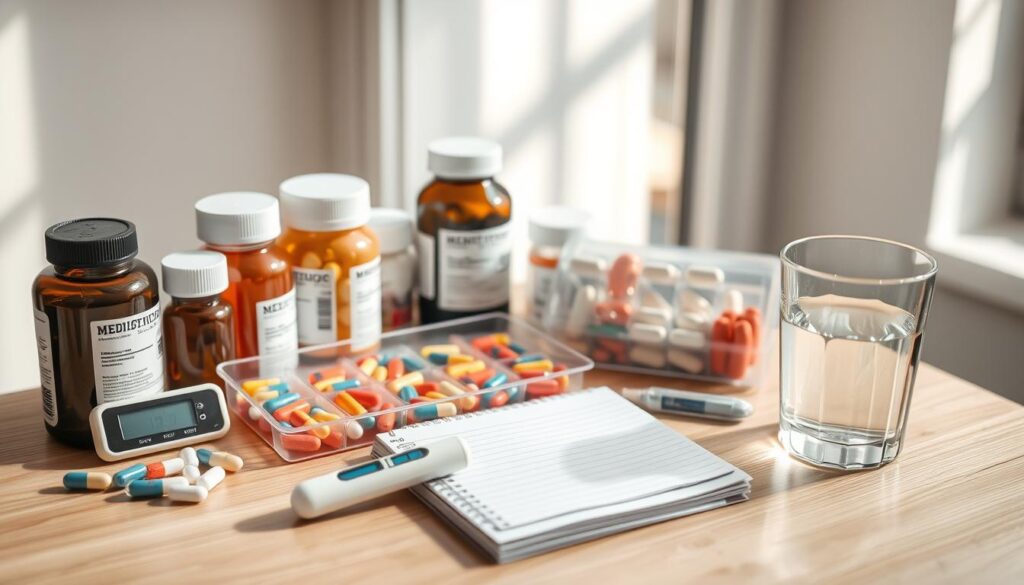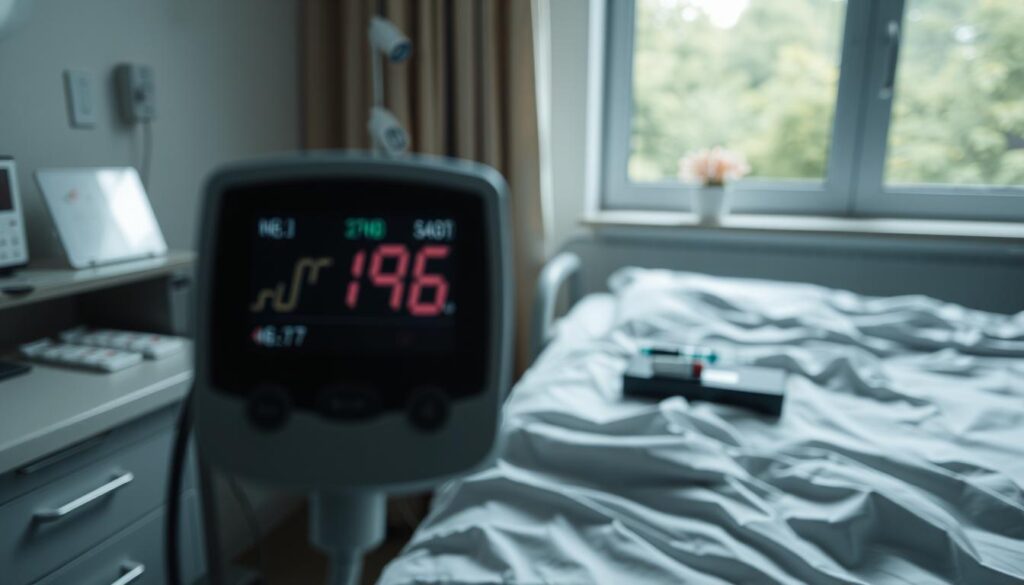High blood sugar can happen after surgery. It affects both people with diabetes and those without. Every year, 310 million surgeries are done worldwide. In the United States, 40-50 million surgeries happen.
Surgery can make blood sugar levels go up. This can lead to infections, slow healing, and serious problems. It’s important to know why this happens and how to manage it to recover well.
Key Takeaways
- Post-surgical high blood sugar is a common issue, affecting both diabetic and non-diabetic patients.
- Hyperglycemia can increase the risk of infections, delayed wound healing, and other complications.
- Surgical stress and anesthesia can disrupt your body’s normal blood sugar regulation.
- Consistent glucose monitoring, medication management, and a balanced diet are essential for maintaining healthy blood sugar levels during recovery.
- Prompt identification and management of post-operative hyperglycemia can help prevent serious health issues.
Understanding Post-Surgical Blood Sugar Changes
Surgery can really stress the body. This stress can make blood sugar levels go up and down. The body makes more stress hormones like cortisol and catecholamines. These can make it hard for the body to use insulin well, leading to high blood glucose levels.
Effects of Surgical Stress on Blood Glucose
This stress can make blood sugar levels too high. It’s called hyperglycemia. It happens when blood sugar is over 140-180 mg/dL within 48 hours after surgery. People without diabetes can also get this.
It’s important to know how stress hormones work. And how long blood sugar levels stay high after surgery. This helps manage blood sugar after surgery.
Role of Stress Hormones
Stress hormones like cortisol and catecholamines increase after surgery. They can make it hard for the body to use insulin. This makes it hard to keep blood sugar levels stable.
Duration of Blood Sugar Fluctuations
These changes in blood sugar can last from 9 to 21 days. It depends on how serious the surgery was and how the person reacts to stress. It’s key to watch blood sugar closely during this time. This helps avoid problems and helps the body heal.
“Perioperative hyperglycemia is reported in approximately 20–40% of patients after general surgery and almost 80% of patients undergoing cardiac surgery.”
High Blood Sugar After Surgery: Causes and Risk Factors
Surgery can change your body’s blood sugar levels. This is called post-operative hyperglycemia. Stress from the surgery, changes in your habits, and medication adjustments play a role.
If you have diabetes, you’re more likely to see blood sugar changes after surgery. But, people without diabetes can also see high glucose levels. The surgery type, how long it lasts, and your health can affect how bad it gets.
Studies show that one in five patients after vascular surgery have high blood sugar. Those with high blood sugar but no diabetes are more likely to get infections. They also stay in the hospital longer and have a higher chance of dying.
| Key Findings | Percentage |
|---|---|
| Patients with post-operative high blood sugar without a diabetes diagnosis were about twice as likely to have an infection | 100% |
| Patients with post-operative high blood sugar without a diabetes diagnosis were about twice as likely to have a hospital stay longer than 10 days | 100% |
| Patients with post-operative high blood sugar without a diabetes diagnosis had higher odds of in-hospital mortality | Not Specified |
| Diabetes alone was not associated with an increase in infection rates, length of stay, or mortality | 100% |
| No significant difference in hospital readmissions was found based on the presence of hyperglycemia | 100% |
It’s important to know why blood sugar goes up after surgery. This helps doctors manage it better. They can adjust treatments to keep blood sugar in check during recovery.
Impact of Anesthesia on Blood Glucose Levels
Anesthesia can change blood sugar levels during and after surgery. It’s important to know how different anesthetics affect blood sugar. This is especially true for patients with diabetes or blood sugar issues.
Types of Anesthesia and Glucose Response
There are many ways anesthesia can affect blood sugar. Volatile anesthetics can make blood sugar go up in some patients. But, total intravenous anesthesia (TIVA) with drugs like propofol might lower blood sugar. This is because it reduces stress and hormone release.
Duration of Anesthetic Effects
Anesthesia’s effects on blood sugar can last longer than surgery. The choice of anesthesia can affect blood sugar levels before and after surgery. It’s key to keep an eye on blood sugar and adjust treatments as needed.
| Anesthetic Technique | Effect on Glucose Levels |
|---|---|
| Total Inhalation Anesthesia (TIHA) | May increase the risk of hyperglycemia |
| Total Intravenous Anesthesia (TIVA) | May help lower perioperative blood glucose levels |
Managing blood sugar during surgery is very important. It helps avoid complications and helps patients recover better. Knowing how different anesthetics affect blood sugar helps doctors give better care to their patients.
Common Complications of Post-Operative Hyperglycemia
Keeping blood sugar levels healthy is key after surgery. But, high blood sugar can cause serious problems. These issues can affect how well you recover.
One big worry is getting infections at the surgery site. Even a little high blood sugar can increase infection risk. It can go from less than 2% to almost 18%.
High blood sugar can lead to other health issues, like:
- Fluid and electrolyte imbalances
- Kidney problems
- Heart and lung issues
- Neurological problems
- In severe cases, it can even lead to death after surgery
People with diabetes face even more risks. This is because they might have poor blood flow and other health problems. Some diabetes medicines can also make things worse during surgery.
It’s very important to watch for high blood sugar after surgery. This helps avoid bad outcomes. Doctors can keep an eye on blood sugar and use the right treatments. This makes recovery safer and more successful.
| Complication | Impact |
|---|---|
| Surgical Site Infections | Increased risk from less than 2% to almost 18% with elevated blood sugar |
| Fluid and Electrolyte Imbalances | Can lead to serious health issues |
| Kidney Problems | Impaired kidney function can worsen with hyperglycemia |
| Heart and Lung Complications | High blood sugar can strain the cardiovascular and respiratory systems |
| Neurological Issues | Nerve damage and other neurological problems may occur |
| Post-Surgical Death | In severe cases, hyperglycemia can be life-threatening |

“Recognizing and addressing the risks of post-operative hyperglycemia is crucial for improving surgical outcomes and reducing the chances of adverse events.”
Blood Sugar Monitoring Guidelines During Recovery
Keeping blood sugar levels healthy is key after surgery. Doctors watch blood sugar closely in the hospital. They check it before meals and at night.
Patients with long surgeries or unstable blood sugar need more checks. Using a continuous glucose monitor (CGM) can help too.
Recommended Testing Frequencies
- Check blood glucose levels before meals and at bedtime during hospital stays
- Increase monitoring frequency for patients with lengthy surgeries or unstable blood sugar
- Use a continuous glucose monitor (CGM) or other devices to supplement hospital monitoring
Target Blood Sugar Ranges
Doctors set blood sugar targets based on each patient. The usual goals are:
| Blood Glucose Level | Target Range |
|---|---|
| Pre-meal | Below 140 mg/dL |
| Random | Less than 180 mg/dL |
Signs of Blood Sugar Irregularities
Watch for signs of blood sugar problems, like:
- Unusual thirst or frequent urination
- Confusion or disorientation
- Fatigue or nausea
If you notice these signs, tell your doctor right away. They will check and treat you.
Medication Management Before and After Surgery
Managing your medicines is key to keeping your blood sugar in check before and after surgery. If you have diabetes, talk to your doctor about your medicines. Some, like metformin, might need to be changed or stopped before your surgery.
Medicines for diabetes called SGLT2 inhibitors should stop 3-4 days before surgery. This is because they can cause a serious problem called diabetic ketoacidosis. You might also need to change your insulin doses before and after surgery to keep your sugar levels right.
Working with your surgical team to plan your medicines is very important. This helps avoid problems and keeps your sugar levels where they should be. Here are some tips to keep in mind:
- Check your blood sugar often, especially when you wake up and every hour until you get to the hospital.
- If your sugar is too low, take Dextragel or 4 glucose/dextrose tablets and check again in 10 minutes to make sure it’s going up.
- Your sugar needs to be 5 mmol/L (90 mg/dL) or higher to drive, as the DVLA rules say.
- When you get to the hospital, if your sugar is between 6 mmol/L (108 mg/dL) and 12 mmol/L (216 mg/dL), you can usually have surgery. But if it’s outside this range, you might need treatment first.
- Take all your diabetes medicines, insulin, needles, blood testing stuff, and treatment for low blood sugar to the hospital.
- Your sugar will be checked often during and after surgery.
By working closely with your healthcare team and following their advice on medicines, you can help manage your glucose management. This reduces the risk of diabetes complications and supports a smooth recovery from your surgery.
| Statistic | Value |
|---|---|
| Worldwide diabetes prevalence | 537 million people, projected to increase to 700 million by 2045 |
| Diabetes prevalence in Europe | 1 in 11 adults, approximately 61 million individuals |
| Patients with chronic diseases undergoing surgery | 1 in 4, with diabetes being the second most common comorbidity |
| Patients with diabetes undergoing surgery | 15% of all operative procedures |
| Perioperative hyperglycemia in patients with diabetes | 63% for Type 1, 43% for Type 2 |

Dietary Considerations for Glycemic Control
Eating well is key to keeping blood sugar stable after surgery. Your body needs the right foods to heal and keep blood sugar steady.
Post-Surgery Nutrition Tips
Eat whole foods like fruits, vegetables, whole grains, lean proteins, and healthy fats. These give your body what it needs. Try to get 25-38 grams of fiber per day from foods like oats and broccoli.
Choose low-glycemic index (GI) foods like oats and berries. They don’t raise blood sugar as fast. Avoid foods with a lot of sugar and refined carbs.
Meal Planning Strategies
- Get a meal plan from a registered dietitian. It should fit your needs and likes.
- Add lean proteins like chicken, fish, or tofu to your meals. They help keep blood sugar steady.
- Drink at least 9-13 cups of fluids per day. It helps with post-operative hyperglycemia.
- Try soluble fiber-rich foods like oats, barley, and citrus fruits. They help with glycemic control.
Eating foods that are good for you and staying hydrated helps your body heal. It also keeps your glycemic control in check during perioperative care.
Exercise and Physical Activity During Recovery
Being active is key after surgery and helps with blood sugar. It keeps glucose levels in check and aids healing. But, the right kind and how hard you should work out depends on your surgery and how you’re doing.
Start with easy things like walking. It helps blood flow, lowers clot risk, and keeps blood sugar steady. Even small amounts of activity, like standing or short walks, can help a lot. As you get better, you might do more intense workouts with your doctor’s help.
Being active is very important for managing blood sugar and feeling good during recovery. Talk to your doctors to make a plan that fits you. Exercise helps your body heal and keeps your blood sugar in check.


A Life-Changing Experience with This Weight Loss Supplement (Nagano Tonic)
I’ve always struggled with finding a weight loss solution that actually works for me. Like many, I’ve tried numerous diets, exercise routines, and supplements over the years—some worked for a short time, but nothing ever gave me long-term results. That was until I decided to try the weight loss supplement I found : Link to the Supplement.
From the moment I started using it, I noticed a difference. Not only did I feel more energized, but my cravings also became more manageable. The best part? I started seeing results much quicker than I anticipated! Over the course of just a few weeks, I noticed a significant reduction in belly fat and overall weight loss that I hadn’t been able to achieve before.
What makes this supplement stand out from all the others I’ve tried is how it supports me in my daily routine without any jitters or energy crashes. I’m able to stay focused and motivated, which has made it easier to stay on track with my diet and exercise plan.
This product truly exceeded my expectations, and I feel more confident and healthier than ever before. If you’re struggling with your weight loss journey like I was, I highly recommend giving this supplement a try. It’s been a game-changer for me, and I’m sure it can work wonders for you too!
Contant Them on email .. tonicnagano50@gmail.com
I’ve tried so many weight loss products over the years, but nothing worked like this supplement! Since I started using it, I’ve noticed a big difference in my energy levels and appetite control. In just a few weeks, I’ve lost weight and feel so much better. It’s been easy to stick with, and the results speak for themselves. Highly recommend this to anyone looking to make a real change!
This Nagano Tonic has been amazing! In just a few weeks, I’ve lost weight, feel more energized, and my cravings are under control. Highly recommend it!
Thats the link to purchase http://surl.li/iasppy